
Humanitarian practice
Reflection and analysis on challenges and dilemmas linked to the delivery of humanitarian assistance
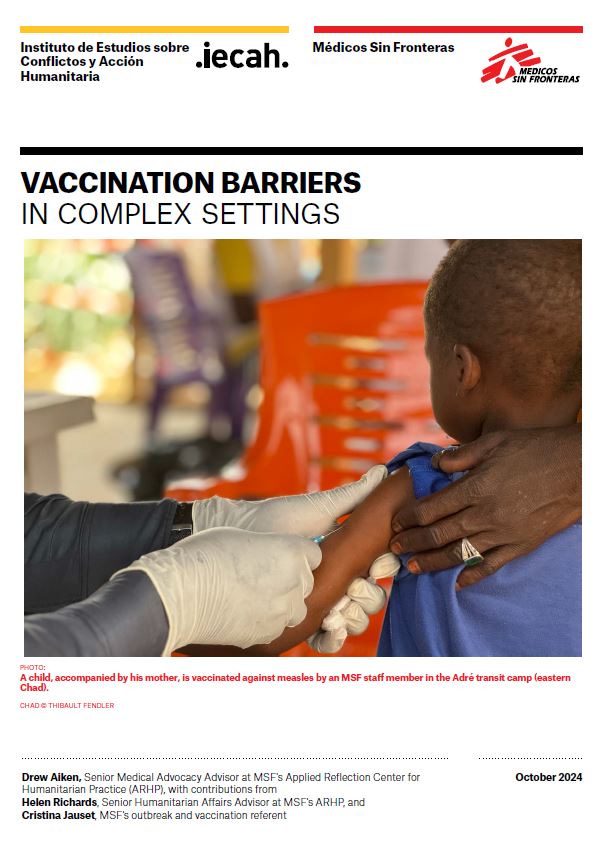
Vaccination barriers in complex settings
Vaccination remains one of the most effective interventions to prevent illness and death. Yet, for people living in conflict and humanitarian settings, access to routine vaccination, vaccination catch up, or needed interventions when outbreak occurs is far from guaranteed.
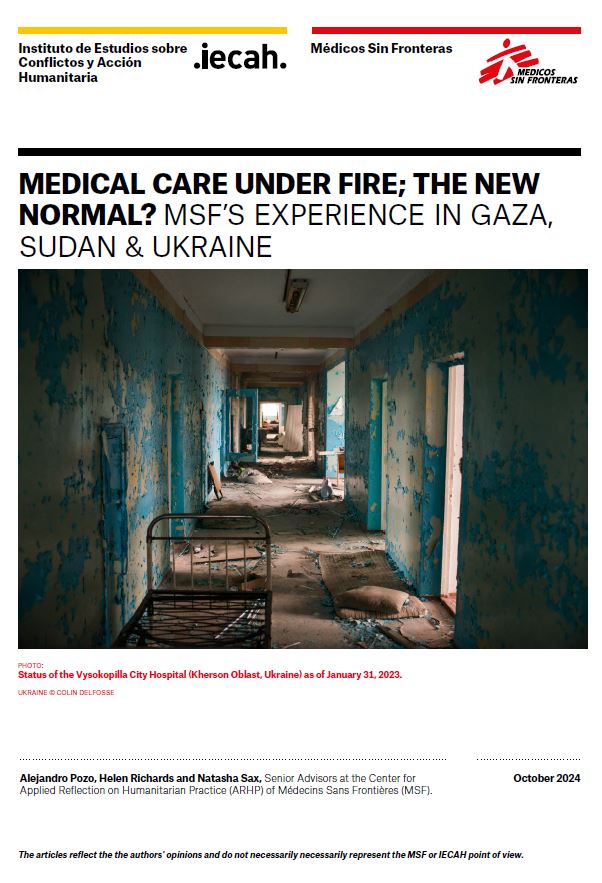
Medical Care Under Fire; The New Normal? The MSF’S experience in Gaza, Sudan & Ukraine
The passing of Resolution 2286 marked a moment of “hope,” and was accompanied by a proliferation of initiatives to report and monitor attacks on medical and humanitarian missions.
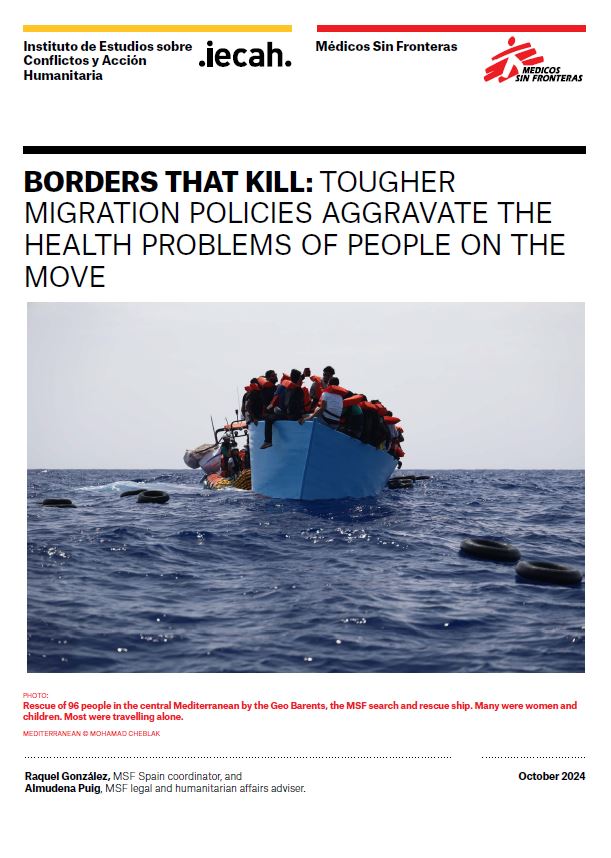
Borders that Kill: Tougher migration policies aggravate the health problems of people on the move
This analysis provides an overview of the situation of vulnerability of migrants, refugees and asylum seekers in different parts of the world due to the tightening of migration policies.
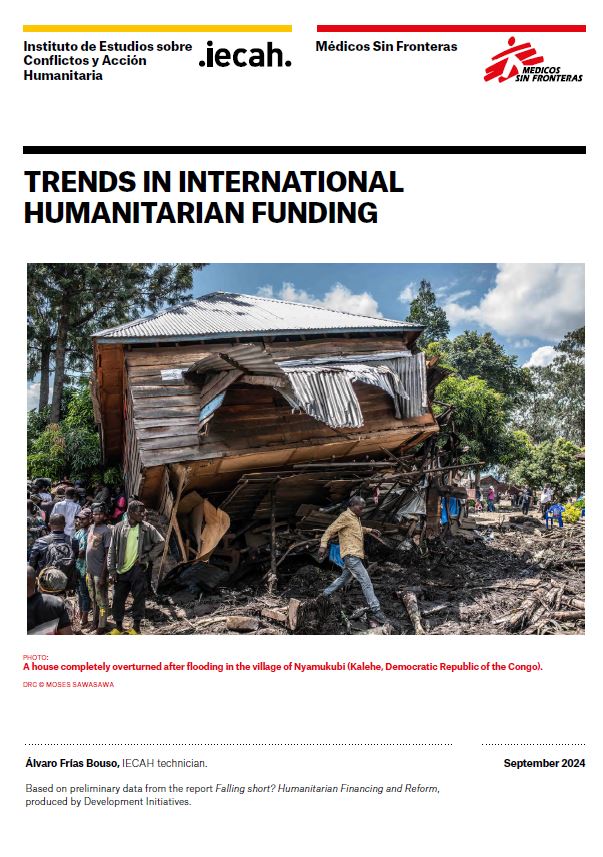
Trends in Global Humanitarian Financing
Despite the increase in funding needs, funds raised for the 45 UN appeals have stagnated compared to 2022, resulting in the largest shortfall since the beginning of the century, with only 45% of funding requirements met.
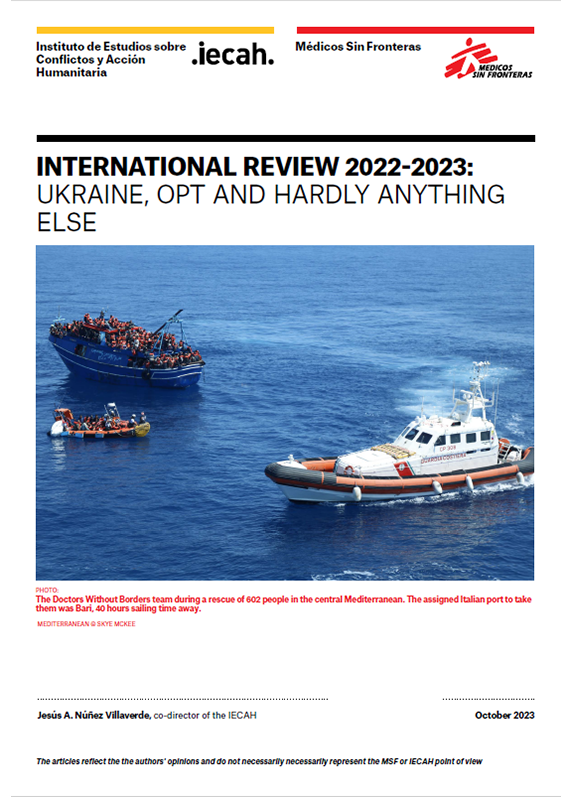
International review 2022-2023
By definition, any review involves looking back to try and identify what has characterised the period under review. More than a chronology of the most significant events, this report serves to try to draw some conclusions that allow us to better understand what has happened and, in the best of cases, to glimpse where efforts should be directed.
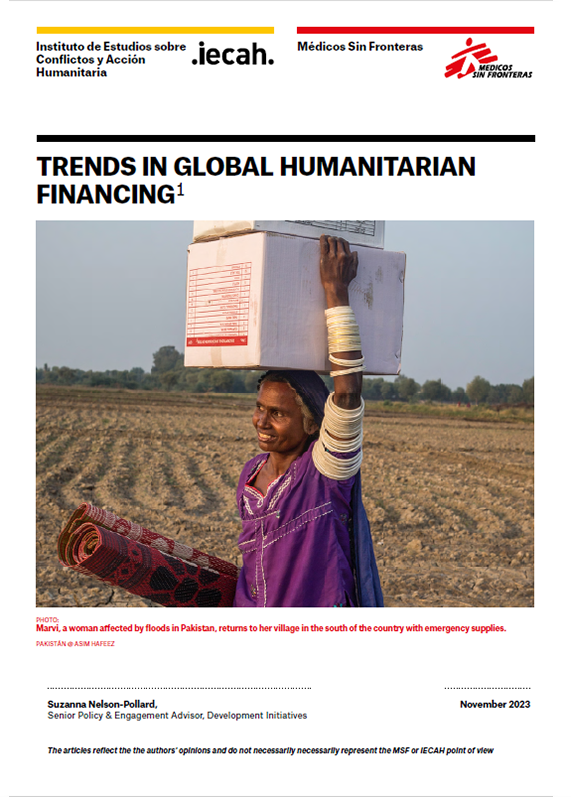
Trends in Global Humanitarian Financing
In 2022, the demand for humanitarian assistance grew larger than ever. There were a growing number of complex, long-term crises, driven by system-wide shocks, as well as new and escalating crises, and worsening crises.
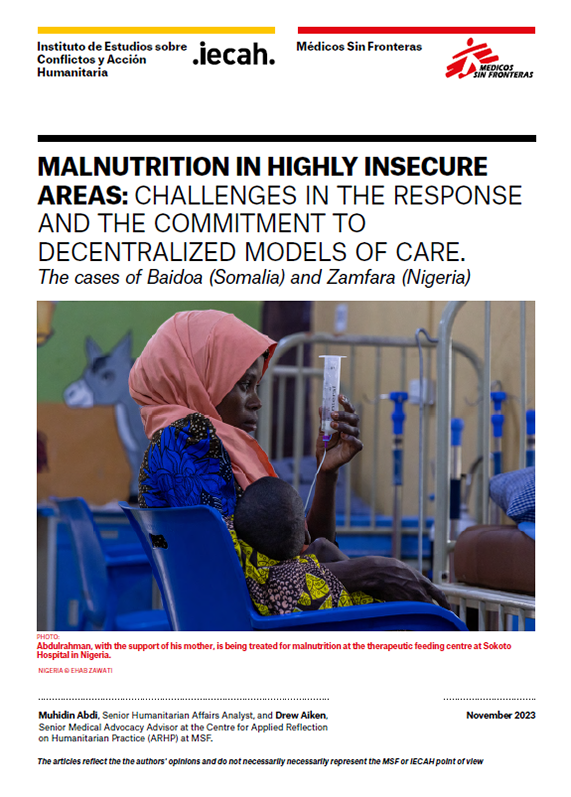
Malnutrition in Highly Insecure Areas
MSF is deeply concerned about the impact of the malnutrition, food insecurity and health crisis we have witnessed in 2022 and 2023 on the populations we serve.
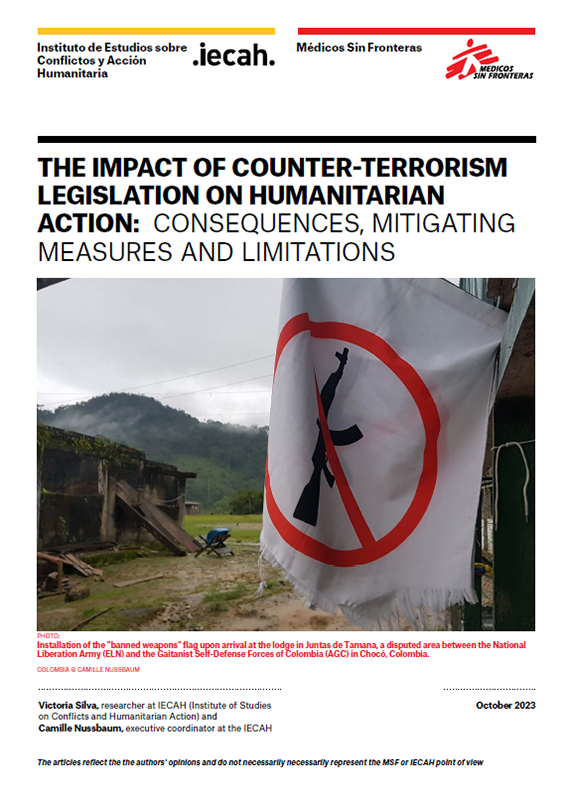
The impact of counter-terrorism legislation on Humanitarian Action
In recent years, there has been growing concern among humanitarian actors, donors and policy-makers about the impact of counter-terrorism legislation on humanitarian work. There are numerous cases in which the work of humanitarian organisations has been affected by this body of (national and international) law.
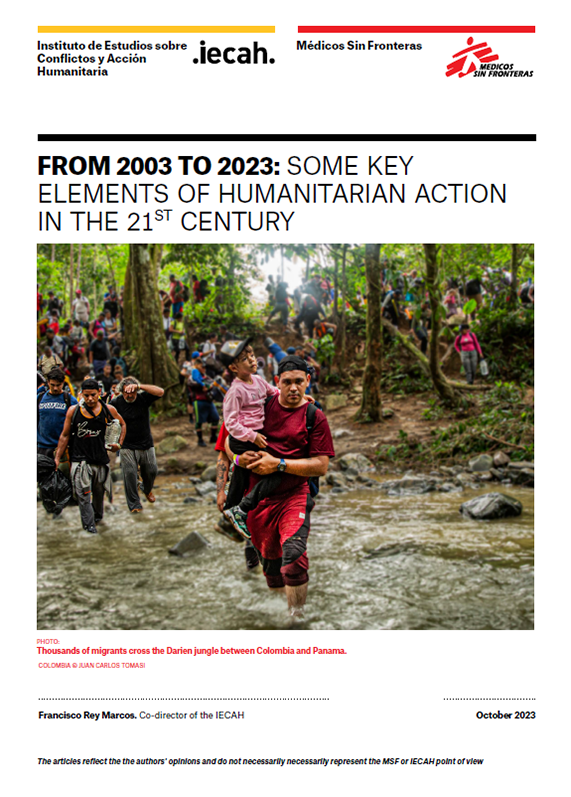
From 2003 to 2023: Some key elements of Humanitarian action in the 21st Century
Since the IECAH and MSF Spain began to prepare and publish the two-yearly Report on Humanitarian Action in the first years of this century, the international scenario has undergone important changes, both at the geopolitical level and in terms of the threats that we face.
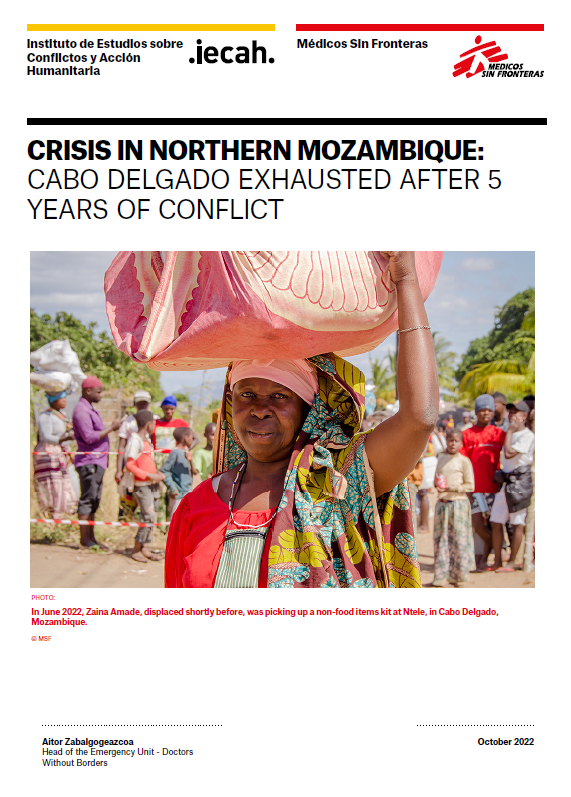
Crisis in northern Mozambique
The displaced families on Maganja beach in Palma district had been waiting for two years to return to Mocimboa de Praia. Since Mocimboa was taken over by a group now calling itself Islamic State in the Province of Mozambique, these families had been living on a strip of beach a few dozen metres wide.
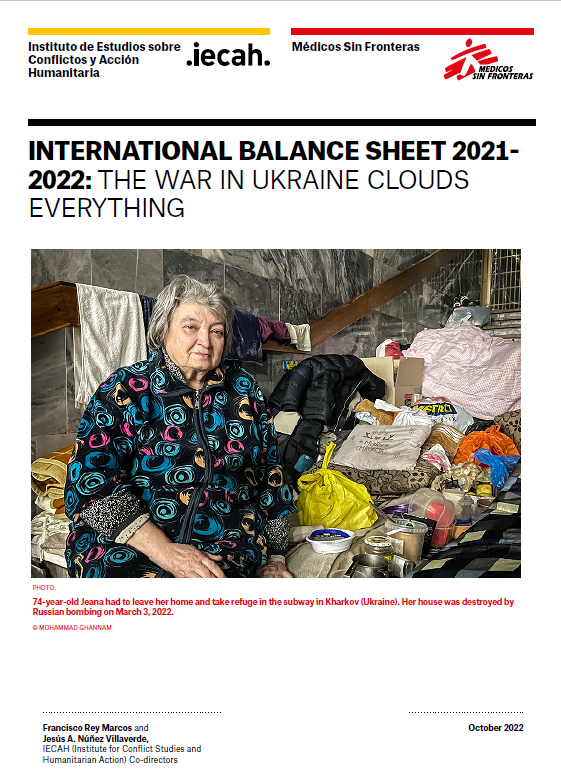
International balance sheet 2021 – 2022
First it was the COVID-19 global pandemic, and then the impact of the new fall of Afghanistan into the hands of the Taliban, now it is the war in Ukraine that has captured the world’s attention.
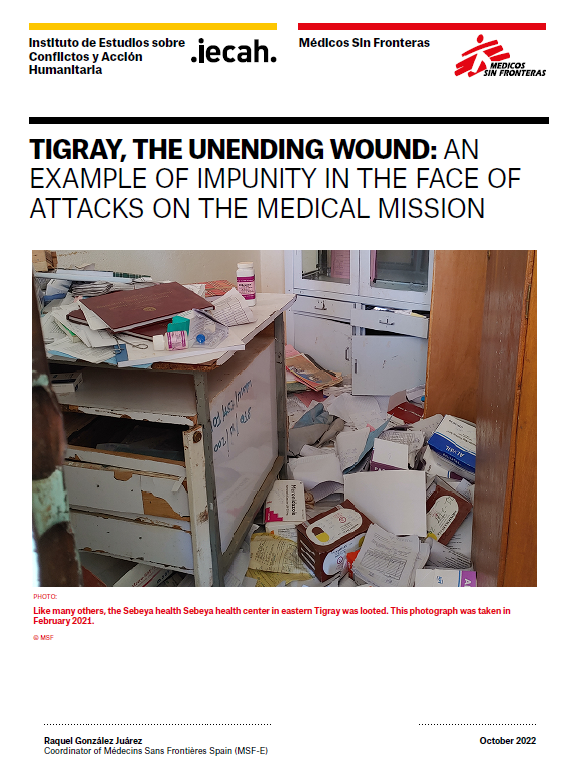
Tigray, the unending wound
This article aims to outline the risks to which medical humanitarian action in conflict zones, in particular Médecins Sans Frontières (MSF), is exposed. Tigray is a painful and open example of the risks we face.
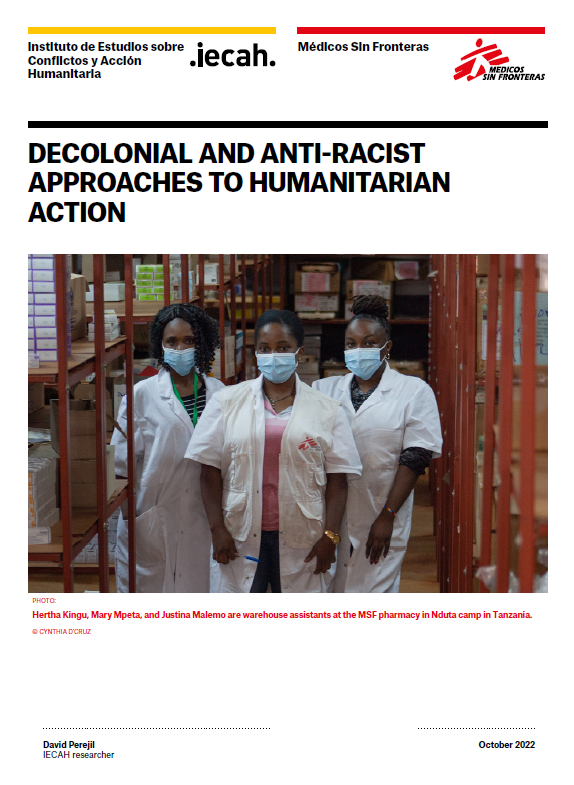
Decolonial and anti-racist approaches to humanitarian action
After decades of post- and decolonial studies, their critiques of the international system have gained weight in recent years.
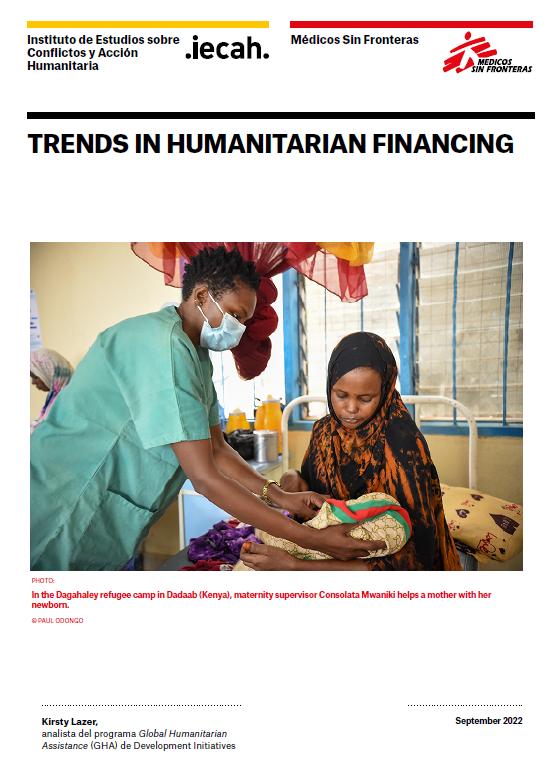
Trends in Humanitarian Financing
Humanitarian financing in the context of rising global need. In 2021, the Covid-19 pandemic continued to overlay other preexisting and emerging crisis risks, driving need and complicating response. Following the rapid rise in demand for humanitarian assistance in 2020, needs remained at historically high levels in 2021.
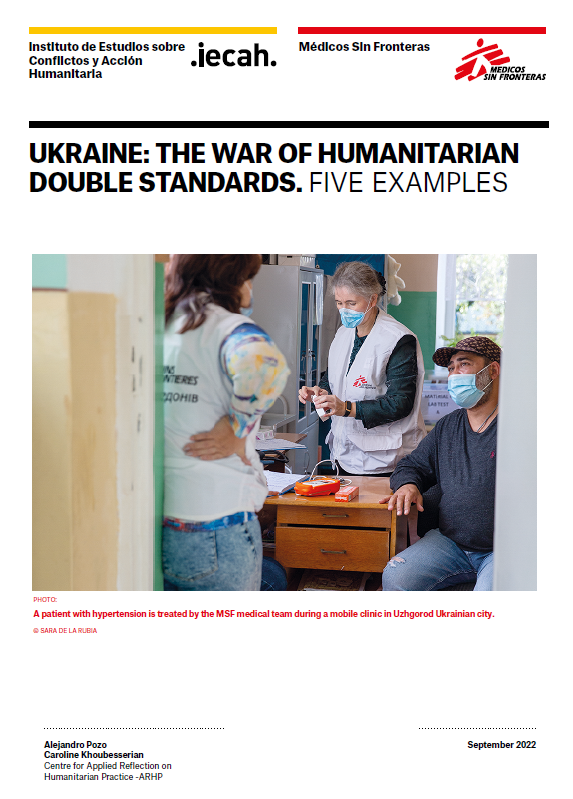
Ukraine: The war of humanitarian double standards
The war in Ukraine, ongoing in 2022, has led to intense levels of suffering for the population, including civilians wounded and killed, families trying to flee to safer areas, and highly vulnerable persons staying in areas amongst heavily destroyed infrastructure and little available services.
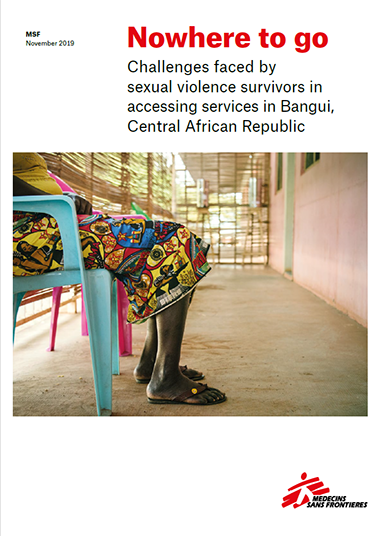
Nowhere to go
Sexual violence (SV) has garnered a lot of attention at international fora in recent months, with millions of dollars in donor funding pledged towards ending this “epidemic”, particularly in areas of armed conflict. However, survivors of SV in CAR aren’t feeling the impact of this momentum due to services often being absent or dysfunctional.
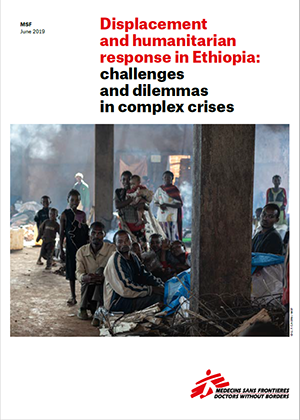
Displacement and humanitarian response in Ethiopia: challenges and dilemmas in complex crises
Since the end of 2017 the number of people internally displaced by violence in Ethiopia has risen significantly. As a result, the humanitarian community — including MSF — has suddenly found itself needing to adapt and scale up its response to meet the acute needs in conflict-driven crises.
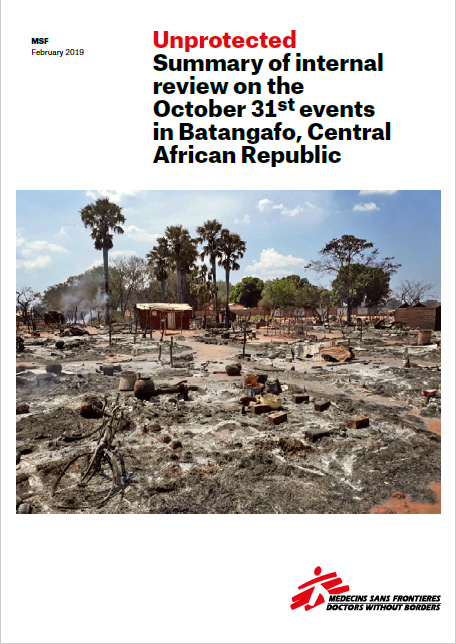
Central African Republic: Unprotected
Summary of internal review on the October 31st events in Batangafo, Central African Republic
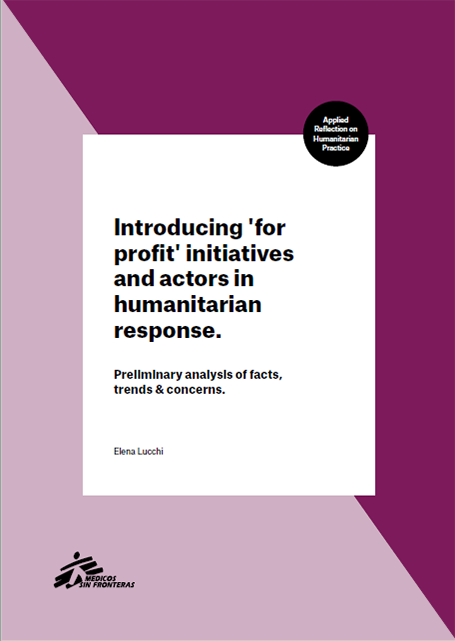
Introducing ‘for profit’ initiatives and actors in humanitarian response
The private sector is increasingly involved in multiple aspects of humanitarian action, and not only as financial contributor. This research maps practices, identifies likely future scenarios regarding the privatisation of the response in emergency contexts and flags concerns regarding practices and trends.
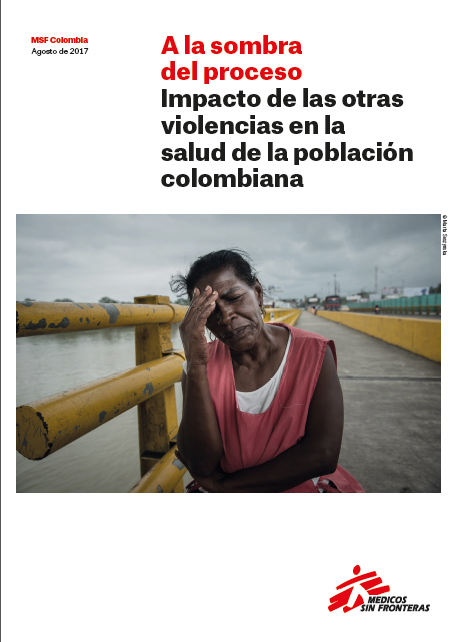
Colombia: in the shadow of the peace process
The report highlights the impact of violence on the health of populations in the municipalities of Buenaventura and Tumaco, where the medical organization Médecins Sans Frontières (MSF) provides health services to populations who are victims of violence.
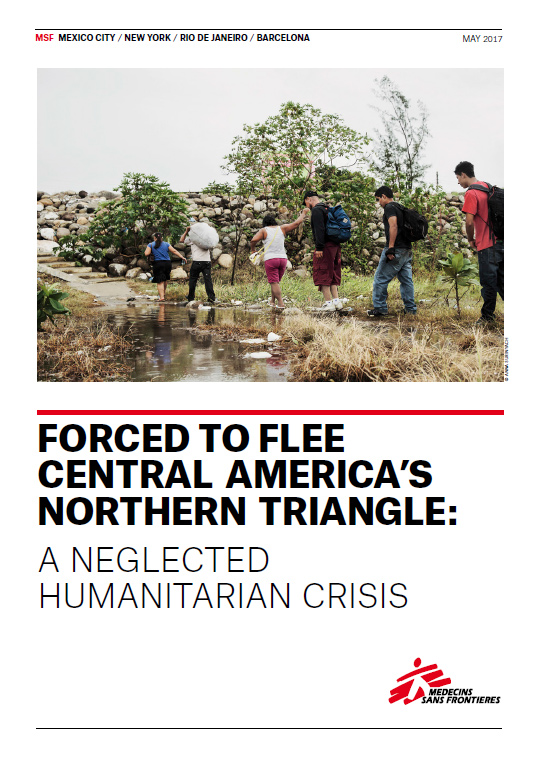
Forced to Flee Central America’s Northern Triangle
Approximately 500,000 people from the Northern Triangle of Central America (NTCA) cross into Mexico every year, fleeing violence and poverty. MSF, as a medical humanitarian organization, and through its medical programs, is witness to the reasons that have caused these people to flee from home.
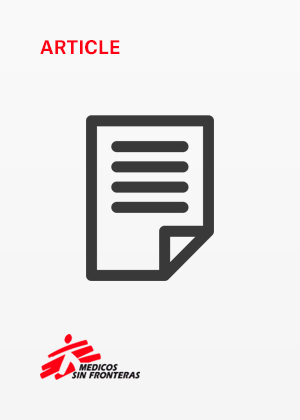
No eyes on the ground
In its 45 years history, Médecins Sans Frontières has used its presence in the field and its proximity to patients to bear witness and bring the plight of populations affected by disease, natural disasters and conflicts to the world’s attention.
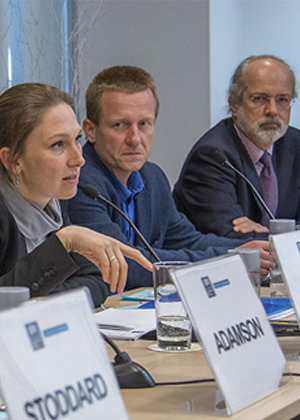
Strengthening Humanitarian Response in Insecure Settings
International Peace Institute (IPI), New York

Emergency gap: Insecurity – always an insurmountable obstacle?
This paper offers a reflection on the subject of risk acceptance, and some of the underlying factors that –apart from the actual security threat– influence security decision-making in the humanitarian sector.
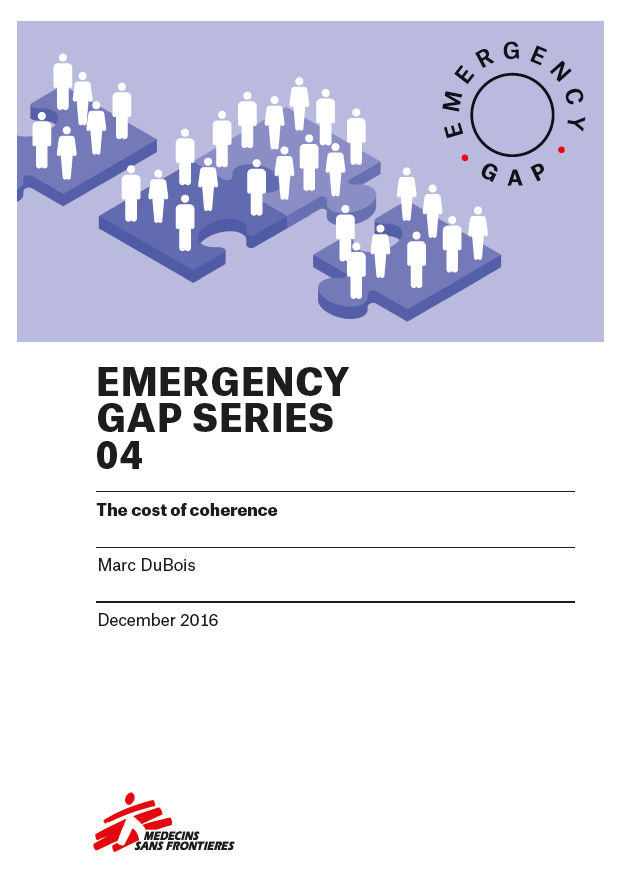
Emergency gap: The cost of coherence
The new WHS paradigm offers a vision for humanitarian action that takes coherence too far, effectively merging humanitarianism into the overarching aid project of the SDGs. The aid sector must work to strengthen complementarity across responders, while preserving the critical distinctions between humanitarian and other forms of action.
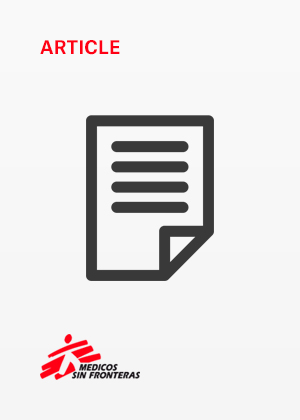
Looking back at 2016
Every year has its share of tragic moments. Every year we deplore that humanity has again been scarred by terrible crises that affect the lives of countless people all over the planet. Yet this year has a different taste.
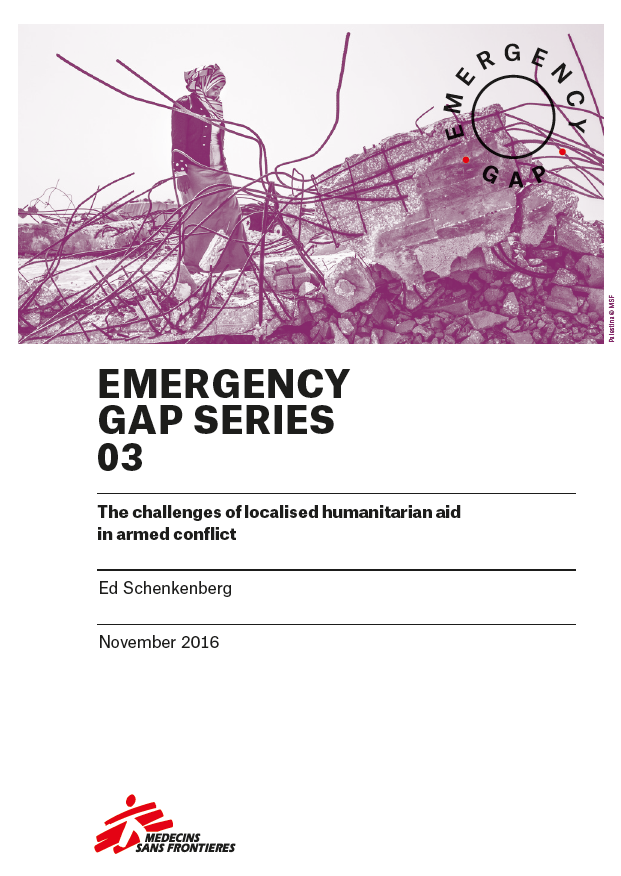
The challenges of localised aid in conflict
Overseas Development Institute (ODI) & Active Learning Network for Accountability and Performance in Humanitarian Action (ALNAP), London
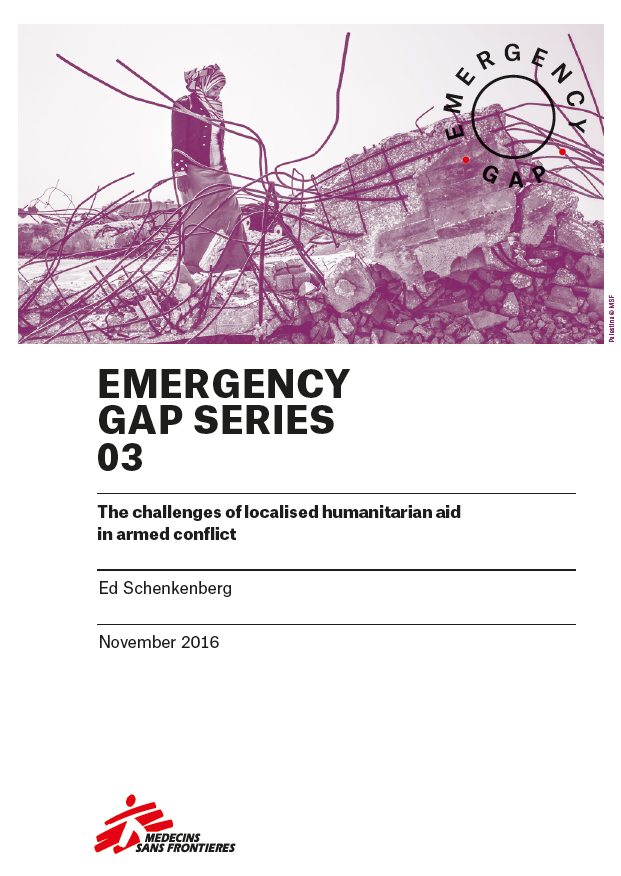
Emergency gap: The challenges of localised humanitarian aid
This paper analyses the role of national and local actors in humanitarian action based on MSF’s experiences in areas within conflict affected countries where the most urgent needs are found.

Niger, Jan 2015 – Aug 2016
This case study of the ‘humanitarian system’s’ response to a conflict driven displacement crisis in the Diffa region of Niger explores if there is an ‘Emergency Gap’. This report concludes that there has been a gap in what could reasonably be expected in terms of effective humanitarian response, and that the reasons for this gap are found in an analysis of the internal dynamics of the system as much as in any external constraints.
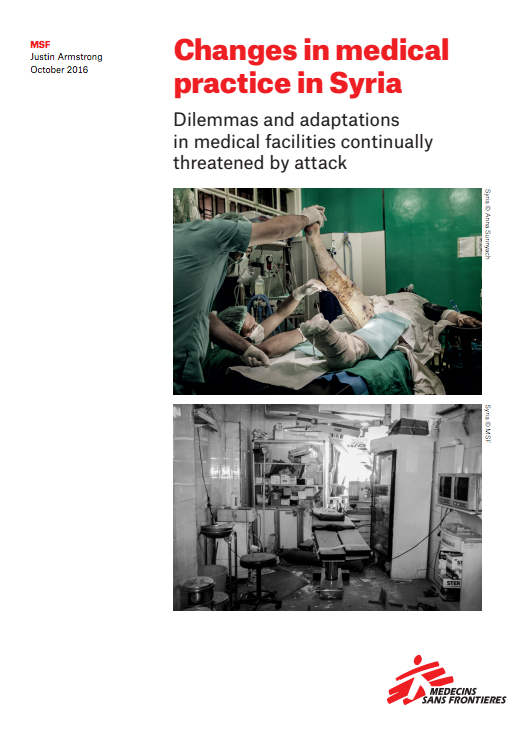
Round table ‘Changes in Humanitarian Medical Practice in Highly Insecure Settings’
La Casa Encendida Auditorium, Madrid
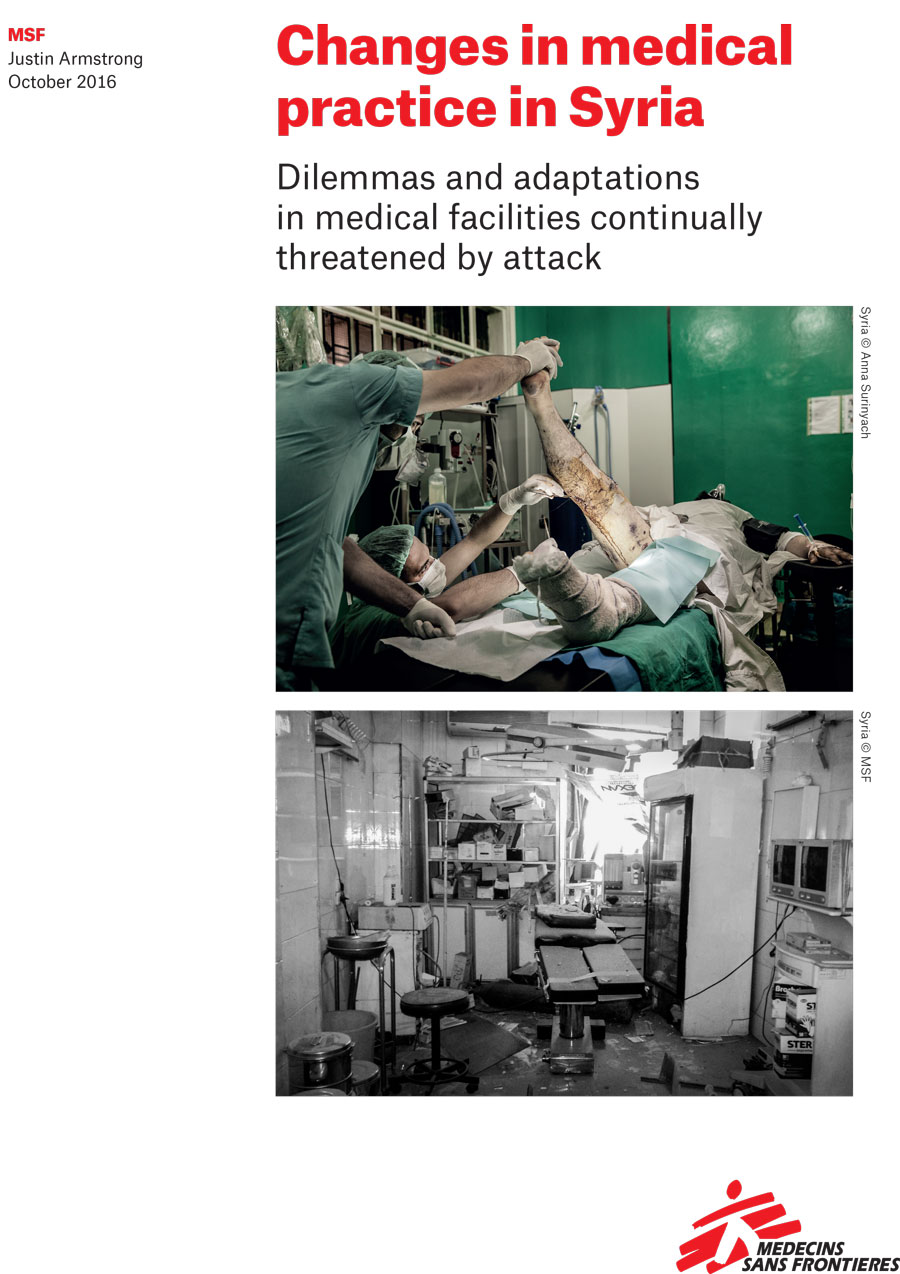
Changes in medical practice in Syria
This seeks to document how the looming threat of violence –intentional or indiscriminate– against medical facilities, vehicles, staff and patients affects the medical care that can still be provided under these circumstances. Specifically, this report aims to document the adaptations forced by the threat of attacks on medical facilities in Syria, focusing on both the direct medical adaptations as well as the operational ones.
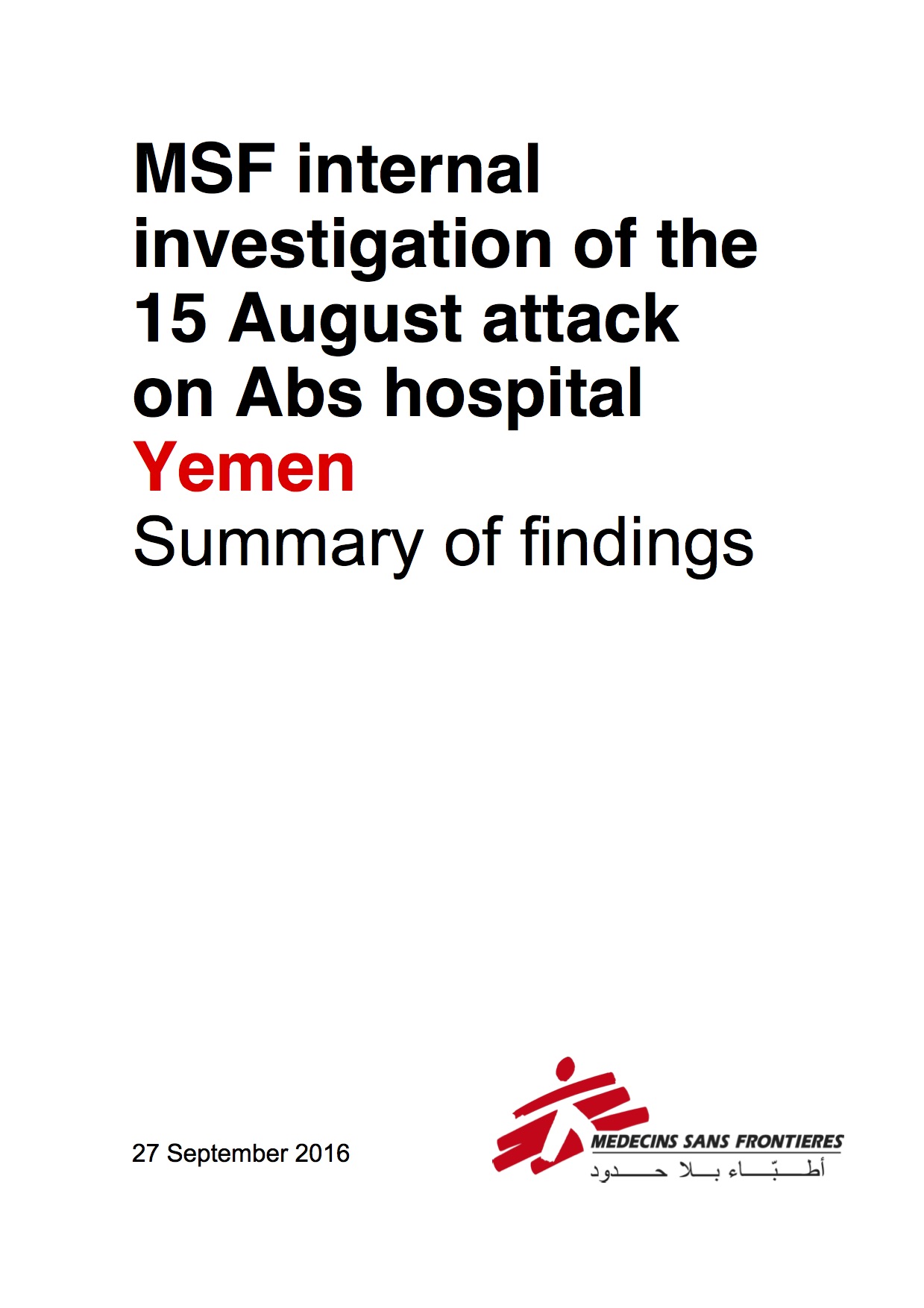
MSF internal investigation of the 15 August attack on Abs hospital
his report summarises the findings from the internal investigation of the attack on the Médecins Sans Frontières (MSF)-supported Abs rural hospital in the Hajjah governorate in Yemen.
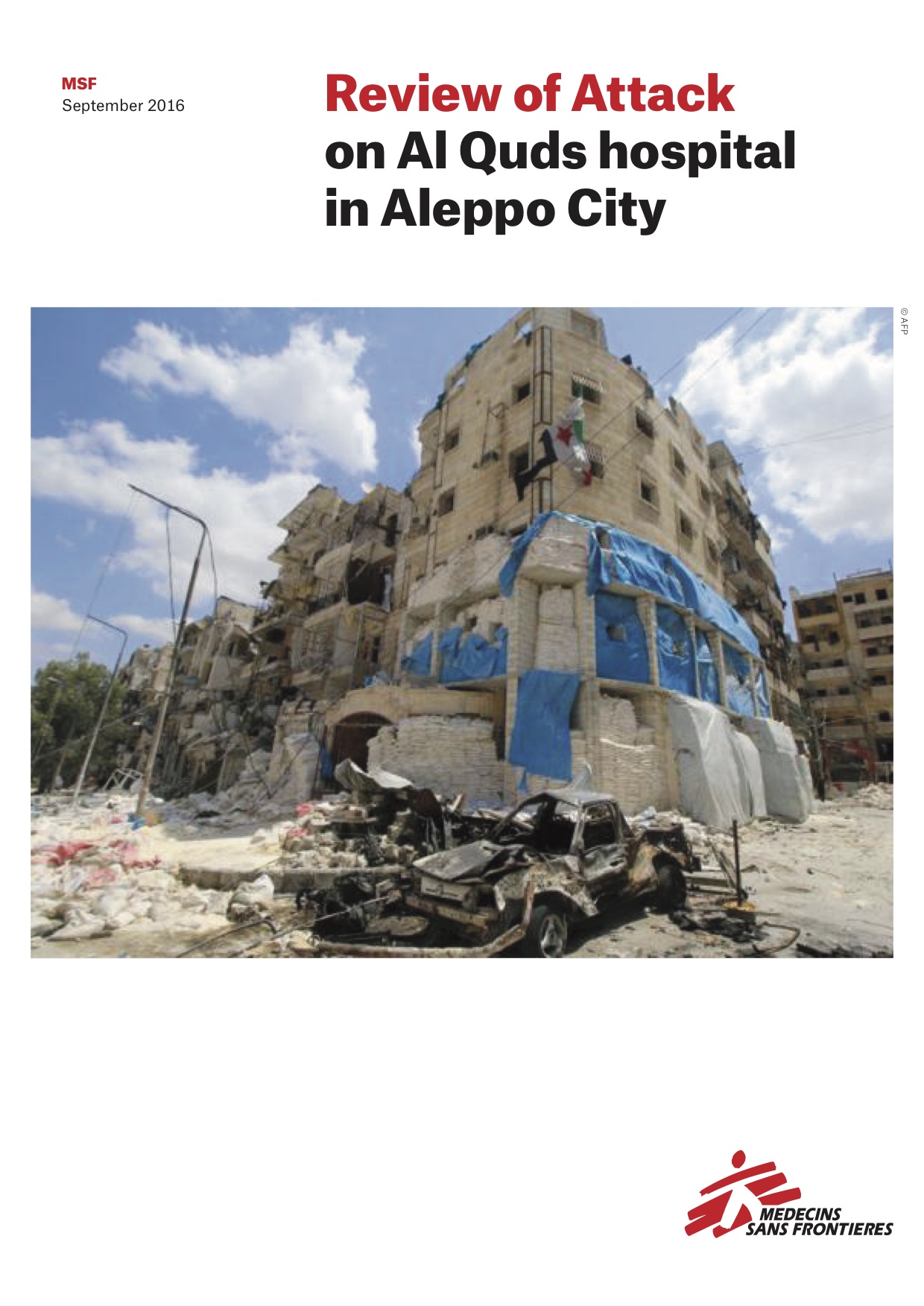
Review of Attack on Al Quds hospital in Aleppo City
Following the 27 April 2016 attack, this report aims to describe the bombardment on Basel Aslan (Al Quds) hospital and to illustrate the humanitarian consequences on the population in the wake of the long-term trend of attacks on medical facilities in East Aleppo.
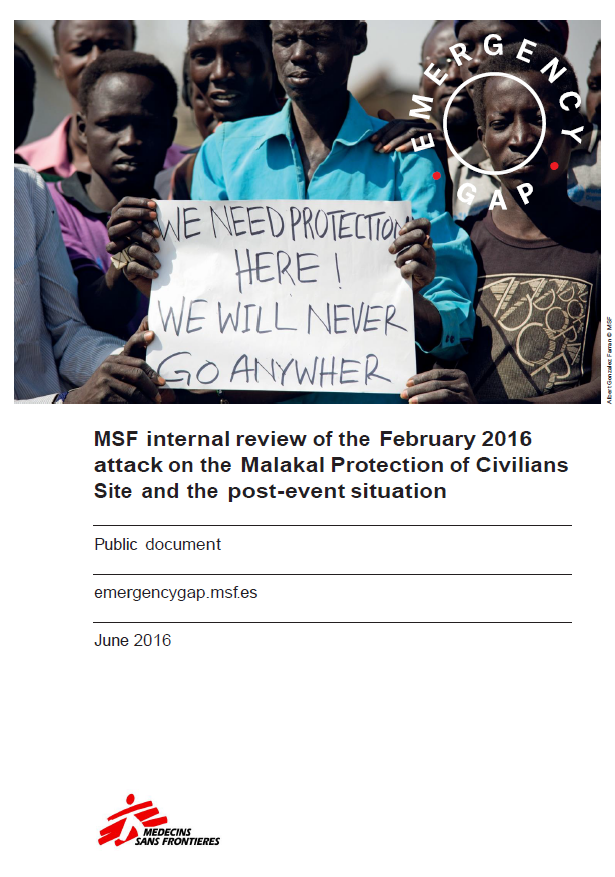
MSF internal review of the February 2016 attack on the Malakal Protection of Civilians Site and the post-event situation
This report constitutes the findings of an internal MSF review into the eruption of violence among internally displaced persons (IDPs) of different ethnic groups in a Protection of Civilians (PoC) site in Malakal, South Sudan on 17 February 2016 that left many dead (including 2 MSF staff), 108 injured and over 29,000 IDPs displaced once again.
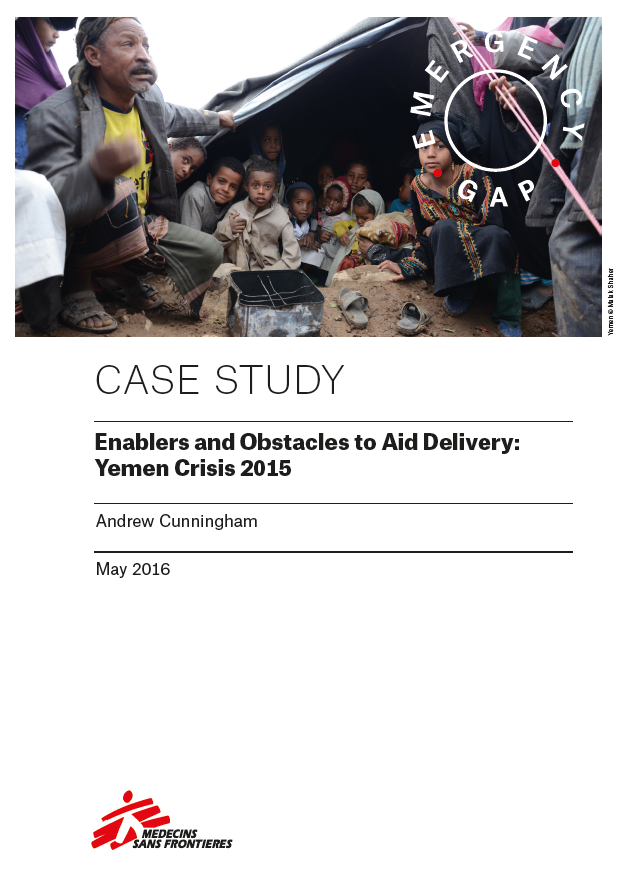
Round Table ‘Insecurity in Yemen, impossible obstacle or surmountable challenge?’
La Casa Encendida Auditorium, Madrid
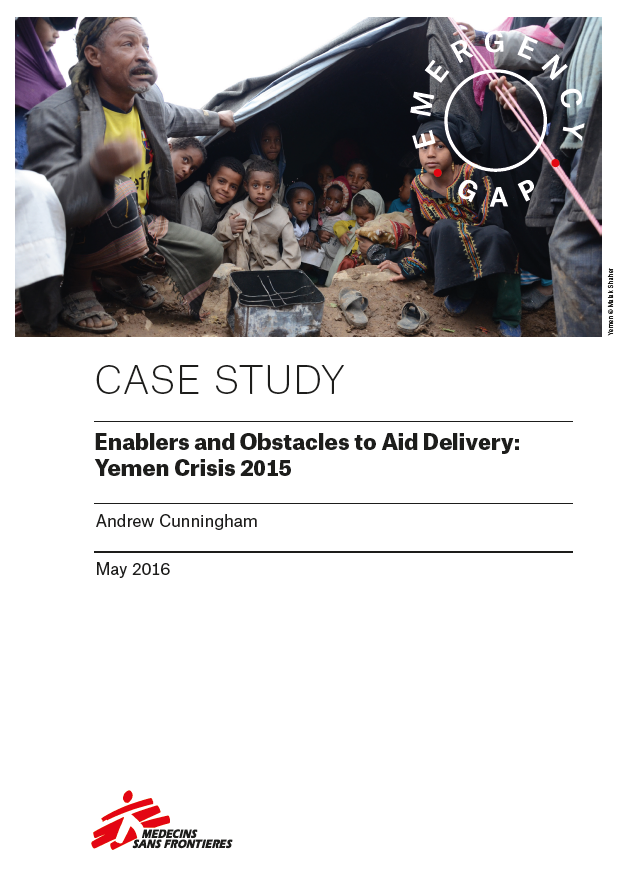
Enablers and Obstacles to Aid Delivery: Yemen Crisis 2015
The humanitarian community has failed to adequately respond to the humanitarian crisis in Yemen. This report examines how humanitarian organisations responded to the crisis in 2015 and analyses the obstacles and enablers to aid delivery. Four themes have been explored in detail: humanitarian leadership; political issues and negotiated access; security management; and resources.
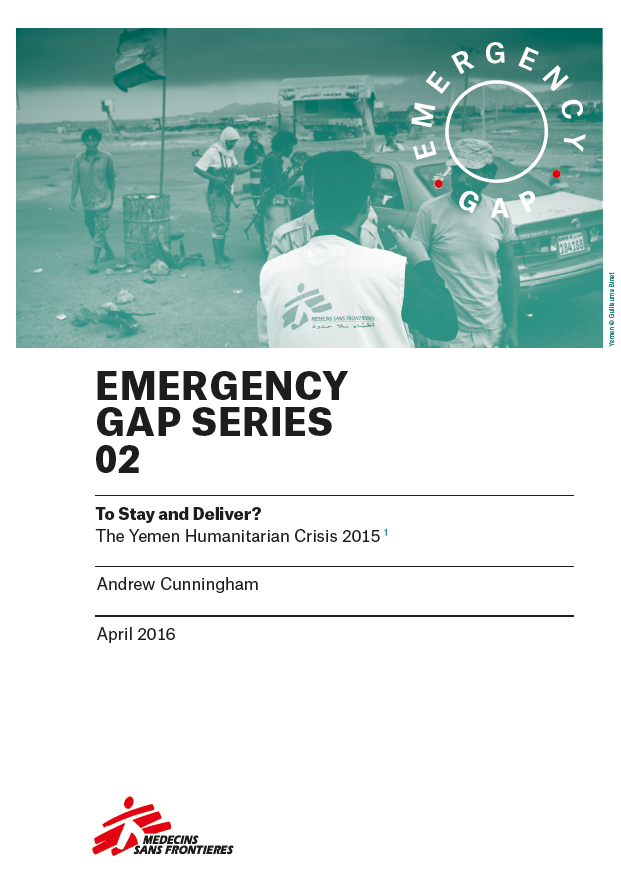
‘Stay and Deliver’ Yemen Report
The role of humanitarian aid is to assist populations in dire need, such as those suffering the consequences of conflict. But the system does not always work. In some recent humanitarian crises the humanitarian system has failed to deliver needed aid. One such failure has been the Yemen response.
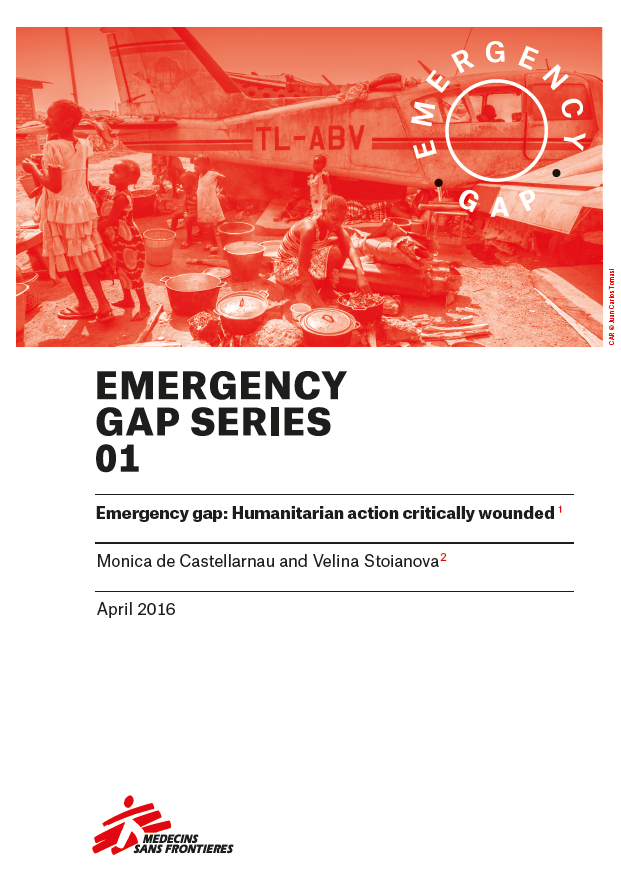
Emergency gap: Humanitarian action critically wounded
This paper offers a reflection on the subject of risk acceptance, and some of the underlying factors that –apart from the actual security threat– influence security decision-making in the humanitarian sector.
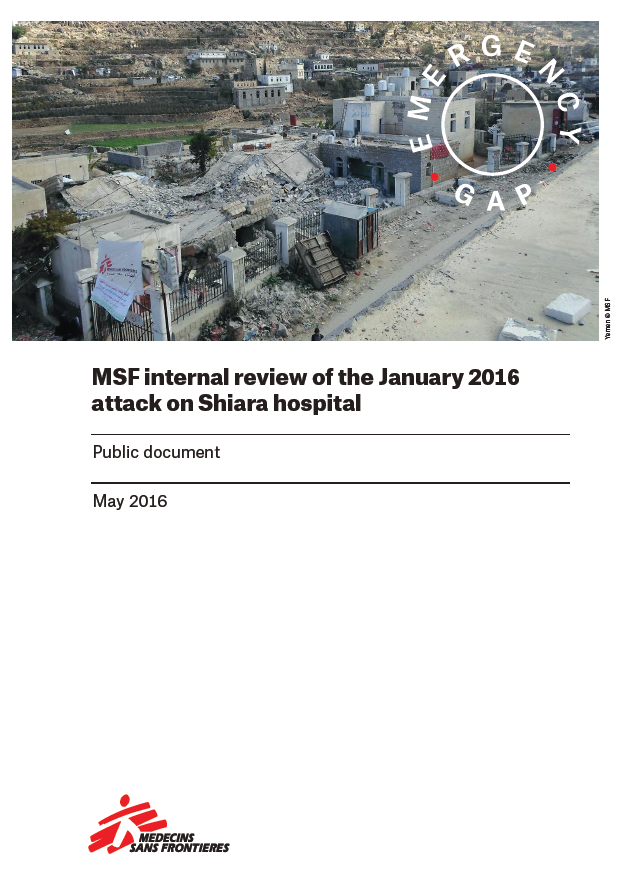
MSF internal review of the January 2016 attack on Shiara hospital
On 10 January 2016, the Médecins sans Frontières (MSF) supported Shiara hospital in Northern Yemen was hit by a projectile, causing the death of six people and resulting in another injured, all of them civilians. The MSF internal investigation into the attack was finalised on 15 March 2016, and revealed that there was no justifiable or legitimate reason behind the attack.

Refugee crisis in Europe: the triple failure
Europe had a shocking “rentrée” from the summer holidays this September. As government officials returned to their suits and offices and kids throughout the continent returned to school, the Greek islands had become a highway for people fleeing war. In a matter of days the highway extended through to the Balkans on the tracks of a previously less trodden migration path into the European heartland. In no time thousands of people amassed in Hungary’s borders as this government attempted to halt their advance.

Yemen: humanitarian action on stand-by
Yemen is a country with an exceedingly rich history. Its rolling mountains and rugged desert terrain lie where one of our oldest civilisations once stood, encompassing an intricate cultural and tribal past. The Prophet Mohammed once said of Yemen that it would be the last refuge for his army, should they need to escape and seek safety in the face of danger.
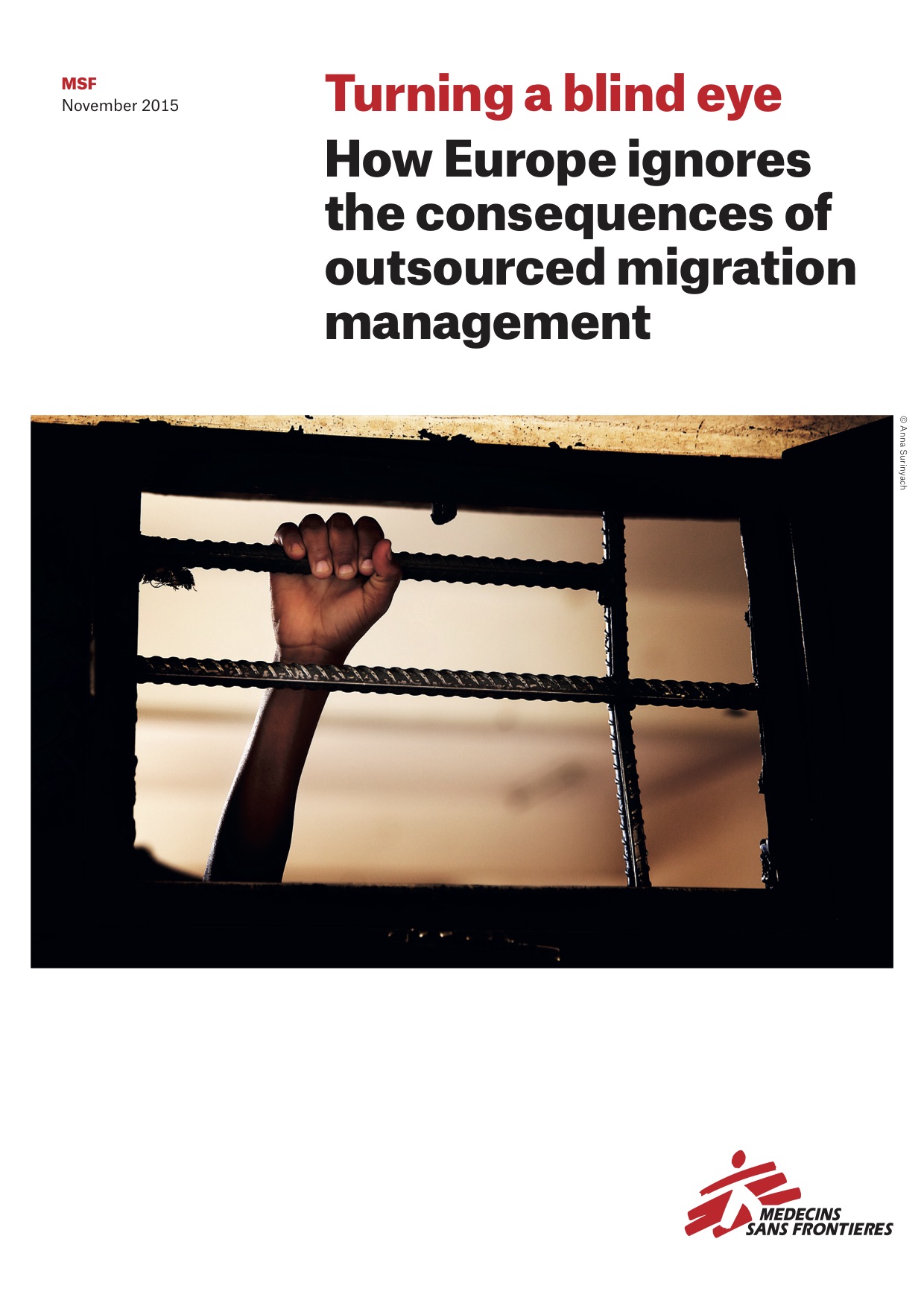
Turning a blind eye
This report seeks to draw attention to some of the humanitarian and medical consequences that have resulted from the enforcement of past migration cooperation deals. While the intended impact may be to prevent people from reaching Europe, MSF has seen unacceptable unintended impacts, which includes widespread abuse; expulsions of vulnerable groups to the desert; prolonged detention; and the criminalisation of asylum seekers, refugees and migrants, undermining existing legal frameworks for their protection.
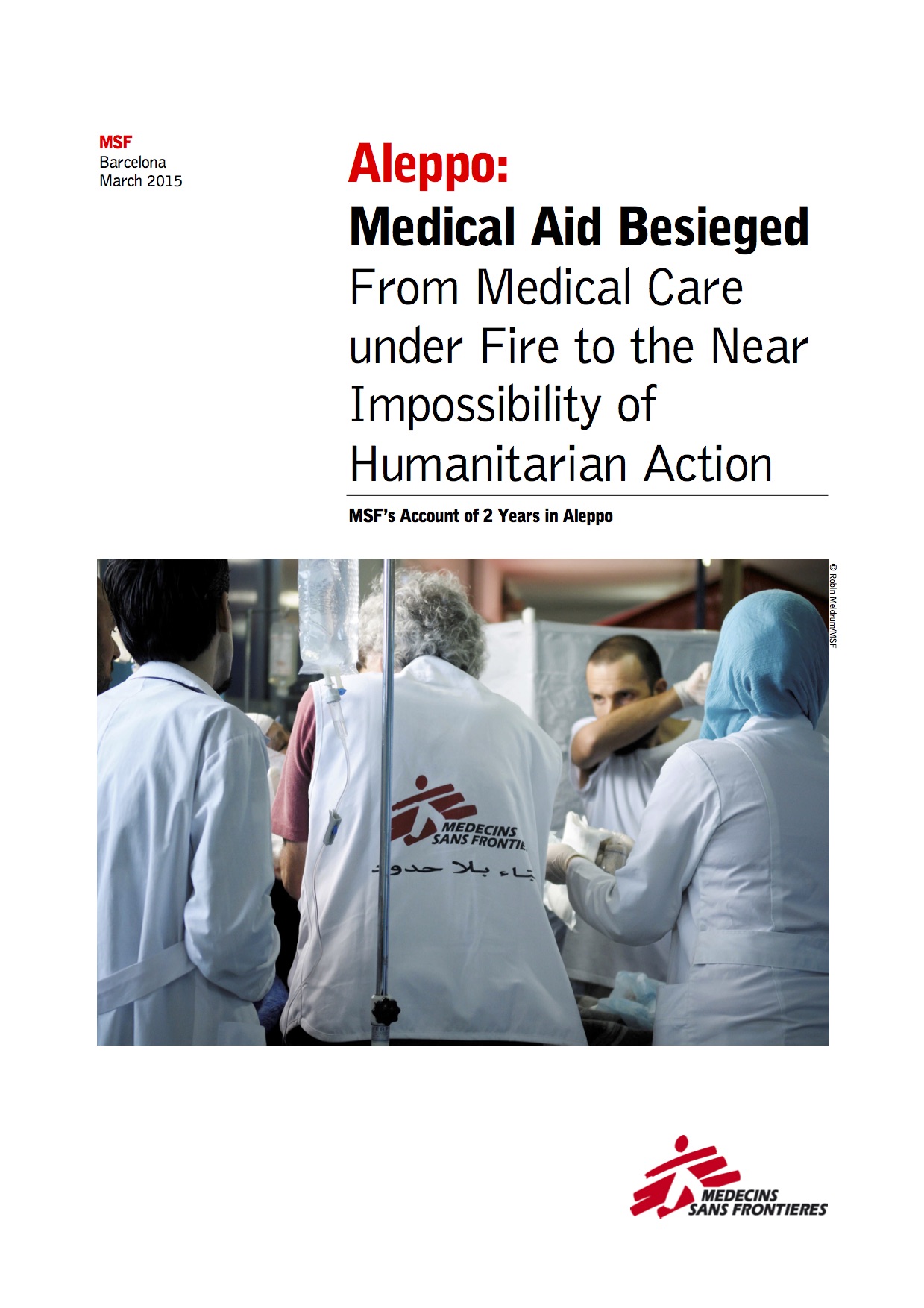
Aleppo: Medical Aid Besieged From Medical Care under Fire to the Near Impossibility of Humanitarian Action
The report analyses the themes of violence against the medical mission in Aleppo and the surrounding rural area since the beginning of MSF’s intervention in 2012. MSF’s account of two years in Aleppo is one of immense complexity and adaptation to a highly volatile and constantly changing security context.
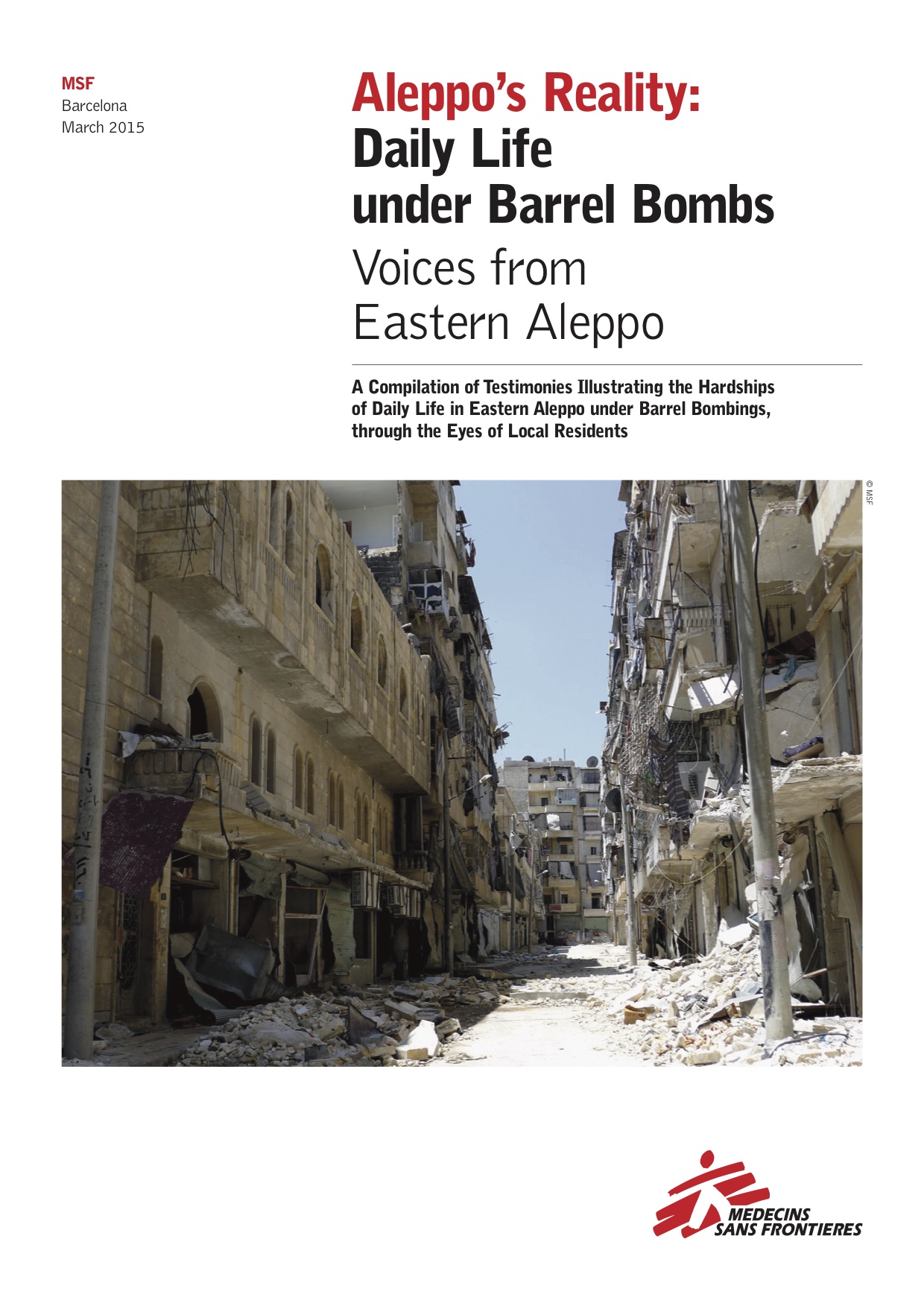
Aleppo’s Reality: Daily Life under Barrel Bombs
A Compilation of Testimonies Illustrating the Hardships of Daily Life Caused by Repeated Barrel Bombings and Other Hardships in Eastern Aleppo.
